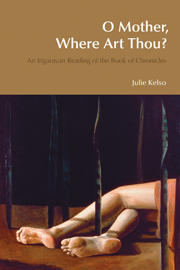Book contents
- Frontmatter
- Dedication
- Contents
- Acknowledgments
- INTRODUCTION: A QUESTION OF SILENCE
- PART I FEMINISM, PSYCHOANALYSIS, AND THE HEBREW BIBLE: “INTRODUCING” LUCE IRIGARAY
- Part II OUR PRODUCTION OF A PAST, IN THE PRESENT OF ANALAYSIS: ENGAGING WITH THE BOOK OF CHRONICLES
- Conclusion
- Notes
- Bibliography
- Index of References
- Index of Authors
INTRODUCTION: A QUESTION OF SILENCE
- Frontmatter
- Dedication
- Contents
- Acknowledgments
- INTRODUCTION: A QUESTION OF SILENCE
- PART I FEMINISM, PSYCHOANALYSIS, AND THE HEBREW BIBLE: “INTRODUCING” LUCE IRIGARAY
- Part II OUR PRODUCTION OF A PAST, IN THE PRESENT OF ANALAYSIS: ENGAGING WITH THE BOOK OF CHRONICLES
- Conclusion
- Notes
- Bibliography
- Index of References
- Index of Authors
Summary
So some speak and others are silent
(Irigaray, 1985a: 257)Throughout this book I argue that the book of Chronicles silences women in specific ways, most radically through their association with maternity. Drawing upon the earlier, psychoanalytically-inspired work of Luce Irigaray and the more recent work of Michelle Boulous Walker, I argue that we may discern two principal strategies of silencing women in Chronicles: disavowal and repression. In its simplest form, the silencing of women takes place through both an explicit and implicit strategy of excluding them from the central narrative action. Largely banished from the central action, they are hardly able to contribute to the production of Israel's past. On a more complex level, however, women are most effectively silenced through their association with maternity, because the maternal body is both disavowed and repressed in Chronicles. The association of women with maternity, along with the disavowal and the repression of the maternal body as “origin” of the masculine subject, effects and guarantees the silence of the feminine, enabling “man” to imagine himself as sole producer of his world. These strategies of silencing the “feminine” need to be understood in relation to the relative absence of women from the narrative world of Chronicles. This absence, however, has passed by largely unnoticed in Biblical Studies. Chronicles itself is understood as an inclusive rather than exclusive text. However, I argue that Chronicles depends on the absence and silence of women for its imaginary coherence.
- Type
- Chapter
- Information
- O Mother, Where Art Thou?An Irigarayan Reading of the Book of Chronicles, pp. 1 - 14Publisher: Acumen PublishingPrint publication year: 2008

